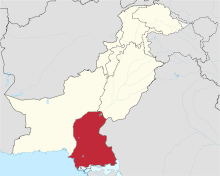Human rights abuses in Sindh
| Human rights abuses in Sindh | |
|---|---|
 Location of Sindh (highlighted in red) | |
| Location | Sindh, Pakistan |
| Date | Ongoing |
| Target | Civilians and combatants |
| Motive | Military clampdown |
There have been allegations that the Pakistani Army and ISI have conducted operations of involuntary disappearances, detentions, and torture on the Sindhi, Baluch and Muhajir political activists. Once caught, these detainees are held in 'safe houses' of intelligence agencies.[1]
Abductions
Well known activist in the Sindhi nationalist movement Dr Safdar Sarki was one of the many disappeared during the period of Gen. Pervez Musharraf's rule, the campaign to "find" him and get him released included prominent human rights organizations, including Amnesty International,[2] and the Asian Human Rights Commission calling for his release, while the New York Times and other news organizations reported that his health was in jeopardy because the Pakistani government refused to allow him necessary medical attention.
Political persecution
There have been many cases of political persecution in Sindh. Much of the persecution is linked to Sindh's provincial government, and is undertaken by Karachi's Crime Investigation Agency (CIA).[3] Many human rights abuses were committed under the tenure of Chief Minister Jam Sadiq Ali, who took office from August 6, 1990 to March 5, 1992. Under his tenure, Sindhi independence leader GM Syed was placed under house arrest until his death; however Jam Sadiq's death in 1992 did not cause these acts to cease. Following his death, his seat was contested between his son, Jam Ashiq Ali and a Pakistan Peoples Party member, Shahanawaz Junejo. Ali's supporters undertook intimidation of PPP activists and Shahanawaz Junejo, as well as 200 other opposition activists who were detained.[3] In Sindh province more than 100 nationalists were abducted and disappeared after 9/11, many were extra judicially killed and their tortured and bullet riddled bodies were dumped on the streets. Alone, from JSMM 13 people are still missing. Its former leader, Mr. Muzzafar Bhutto was two times abducted and kept in military torture cells where he succumbed to his injuries during the second time detention.[4] In a press release of Sunday, 6 March 2011 World Sindhi Congress accused Pakistan authorities for killing political leaders of JSMM also known as Jeay Sindh Muttahida Mahaz. Press release stated that "It should be noted that killing of Mr Zulfiqar Kolachi and arrests of other party activists seems to be part of a sustained campaign to eliminate the leadership of JSMM.[5] In another incident, unidentified armed men shot dead three leaders of JSMM at Bakhorri Mori area in district Sanghar on 2011, April 21. Sindhi nationalist leader Hafeez Hakro alleged that the personnel of law enforcement agencies were involved in Bakhorri Mori incident.[6] Human rights commission of Pakistan also published a report on Bakhorri Mori incident and alleged that Agencies’ role in JSMM activists’ murder must be probed.,[7][8]
See also
References
- ↑ http://www.worldsindhi.org/publishedreports/reports/pdf_for_website.pdf
- ↑ Download Documents | Amnesty International
- 1 2 Human Rights in Developing Countries - Yearbook - Peter R. Baehr"
- ↑ "PAKISTAN: The intelligence agencies target nationalists groups to cover up the activities of Taliban in Sindh province and their inefficiency". Human Rights Watch. Retrieved December 12, 2012.
- ↑ "WSC shocked at the murder of Zulfiqar Kolachi". World Sindhi Congress. Retrieved March 6, 2011.
- ↑ 11 "Three JSMM leaders shot dead in Sanghar" Check
|url=value (help). - ↑ "Agencies' role in JSMM activists' murder must be probed". Human Rights commission of Pakistan. Retrieved May 5, 2011.
- ↑ SANA, Sindhi Association of North America (December 12, 2014). "Houston:Pakistanis protest over killings in Sindh". GEO TV. Retrieved 29 August 2015.
Further reading
- Sindh: Human Rights Abuses Continue Against Fishing Communities - UNPO
- The Foreign Policy of Pakistan: Ethnic Impacts on Diplomacy, 1971-1994 Mehtab Ali Shah ISBN 1-86064-169-5
- Human Rights: Commitment and Betrayal - M. G. Chitkara ISBN 81-7024-727-6
- Human Rights: Annual Report 2004 - Foreign and Commonwealth Office
- Globe, Volume 11, Issues 2-6
- Enforced disappearance Raja Dahar Bhambhro